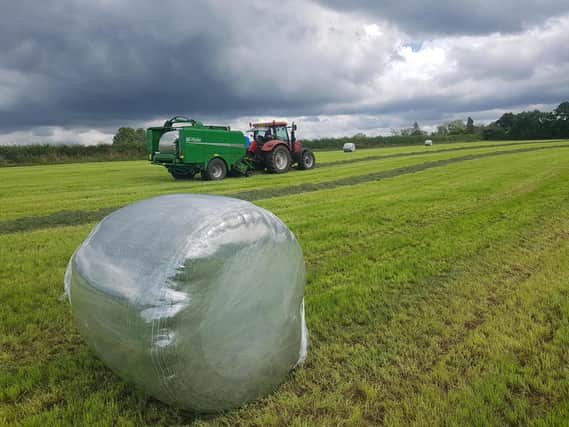Farming


But regardless of the earlier published use of a similar phrase by Daniel Defoe and others, the original author is immaterial to this comment, as it would appear that at least one of these two ‘certainties’ might not be quite as certain as we thought.
For, while it might be a step too far to credit farming’s lobbying organisations with the ability to avert the inevitability of death, a hat must be raised to them for last week’s actions which saw one example of the other certainty of life, if not ruled out, then at least postponed.
Advertisement
Hide AdAdvertisement
Hide AdTo set the scene – at the beginning of last week there was a sudden furore in farming corridors when it was realised that the UK Treasury had quietly slipped silage wrap onto a list of products which would have a £200 a tonne plastic packaging tax applied in a bid to reduce overall packaging or encourage the use of ones containing a higher degree of recycled material.
A populist move from the government, perhaps - but there’s no getting away from the fact that the thoughtless use of unnecessary throwaway plastic packaging is something worth addressing and reducing. And from turtles trapped and drowned in six-pack plastic hoops to the fact that pre-production plastic pellets known as nurdles are now almost as common as sand on many beaches around the world, plastic’s PR has nosedived.
But the use of silage wrap remains an absolute requirement if Scottish farmers are to continue the environmentally sound practice of feeding their sheep and cattle on a grass-based diet the year round. For the micron-thin stretch plastic is the only product available to wrap bales and keep air out allowing a natural fermentation process to effectively pickle grass so it keeps from summer harvest to winter feed.
And, due to the fact that the stretch wrap is so thin and delicate, appropriate alternatives to this plastic have yet to be developed nor are effective recycled materials available.
But while such alternatives might become available in the future, farmers already re-cycle massive quantities of these wraps which are then manufactured into other products.
So rather than being an avoidable material used simply for transporting goods, the wrap is a key part of the production process – and after much lobbying by the farming unions, including NFU Scotland, it has been accepted by the Treasury that silage film is a highly specialised product, the primary purpose of which is to enable the fermentation process needed to produce the silage.
And this ‘non-packaging function’ makes it eligible for exemption from the new tax – and HMRC will shortly publish updated guidance which will reflect this position.
So, even when it’s due, it’s seldom that praise is given to our lobbying organisations - but at around £5 a roll on top of already hefty price rises for wrap driven by higher fuel and raw product prices, I would guess that most farmers would give the unions a pat on the back for pulling this one off. And maybe some of us might even realise that the result alone could well have covered our annual membership subscription.
Advertisement
Hide AdAdvertisement
Hide AdBut lest the top brass and officials of these organisations get too giddy with the unaccustomed praise, it’s not the only fight to be addressed, even on the taxation front.
For the in the same week the Scottish Land Commission came out and with its official recommendation to the Scottish Government to look at bringing a land tax into operation – in order not only to swell the administration’s coffers, but also to help deliver on its plans for both reforming and democratising the ownership of Scotland’s land, which it seems to view as still being in feudal hands.
For, while family farms aren’t likely to be the main target of these proposals, the cross-hairs focusing instead on the both the landed gentry and the newly mega-rich who are often viewed as treating the countryside as their own personal playground, as the introduction of land-based sporting rates showed a few years ago, such units will inevitably be caught up in the process as well.
And many will be hoping that this might be another certainty which can be avoided.
Comments
Want to join the conversation? Please or to comment on this article.